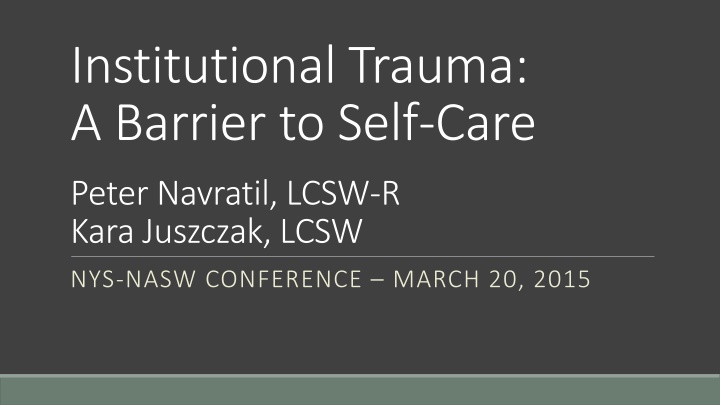
Institutional Trauma and Its Impact on Self-Care
Explore the concept of institutional trauma and its effects on client well-being and professional self-care. Learn to identify, address, and mitigate challenges for maintaining wellness in the face of institutional barriers. Discover strategies to preserve self-care and advocacy in caregiving roles.
Uploaded on | 2 Views
Download Presentation

Please find below an Image/Link to download the presentation.
The content on the website is provided AS IS for your information and personal use only. It may not be sold, licensed, or shared on other websites without obtaining consent from the author. If you encounter any issues during the download, it is possible that the publisher has removed the file from their server.
You are allowed to download the files provided on this website for personal or commercial use, subject to the condition that they are used lawfully. All files are the property of their respective owners.
The content on the website is provided AS IS for your information and personal use only. It may not be sold, licensed, or shared on other websites without obtaining consent from the author.
E N D
Presentation Transcript
Institutional Trauma: A Barrier to Self-Care Peter Navratil, LCSW-R Kara Juszczak, LCSW NYS-NASW CONFERENCE MARCH 20, 2015
Learning Objectives Build awareness of Institutional Trauma, by defining it and exploring the impact on clients and professional self-care. Brainstorm, problem solve, and create goals for how to maintain wellness despite institutional challenges. Create an action plan for preserving self-care and advocacy.
"Care providers are unique people. We have the gift of being able to connect with others in ways that are difficult to explain and even more difficult for others to understand. Our unique ability to join with our clients that allows us a near first-hand experience of their inner world is perhaps our greatest gift; it is also our greatest challenge." -Karl LaRowe, The Caregiving Personality
Society Culture Community Family Client
Compassion Fatigue Compassion Stress - a natural outcome of knowing about trauma experienced by a client, friend, or family member Compassion Fatigue - "a state of exhaustion and dysfunction biologically, psychologically, and emotionally, as a result of prolonged exposure to compassion stress" (Charles Figley, 1995)
Vicarious Trauma When the trauma experienced by the victim/survivor begins to affect the helper in such a way as to create distress Symptoms: hyperarousal (heightened reactivity), intrusive thoughts, recurring dreams, avoidance, emotional "numbing", anxiety, depression
Compassion Fatigue and Vicarious Trauma are unintended consequences of being a helper.
Trauma Stewardship Author: Laura van Dernoot Lipsky
Types of relationships Healthy Unhealthy Toxic
Institutional Trauma The effects on a practitioner from overwhelming demands and expectations of supervisors, organizations, external regulatory systems, funders, and other external systems of care that are inflexible, inadequate, and/or non-responsive to the needs of clients being served (adapted from Newell & MacNiell, 2010)
SOCIAL WORKER CLIENT
PROGRAM SOCIAL WORKER CLIENT
AGENCY PROGRAM SOCIAL WORKER CLIENT
COMMUNITY AGENCY PROGRAM SOCIAL WORKER CLIENT
STATE COMMUNITY AGENCY PROGRAM SOCIAL WORKER CLIENT
FEDERAL STATE COMMUNITY AGENCY PROGRAM SOCIAL WORKER CLIENT
SOCIETY FEDERAL STATE COMMUNITY AGENCY PROGRAM SOCIAL WORKER CLIENT
SOCIETY FEDERAL STATE INSTITUTIONAL TRAUMA COMMUNITY AGENCY PROGRAM SOCIAL WORKER VICARIOUS TRAUMA CLIENT
Power and Control Coercion and Threats Intimidation Emotional Abuse Economic Abuse Power And Control Privilege Isolation Minimizing, Denying, Blaming Adapted from Workplace Bullying wheel - Anne-Marie Quigg June 2011 Using Others
How to Keep Tools Sharp? Self-Care Plan Seek Support Advocate
Self-Care and Wellness Be intentional and purposeful about what you CAN control. Re-define self-care as a unique experience. Consider biopsychosocial- spiritual wellness. Take a Break .
Seek Support Just because we are helpers, doesn't mean we won't need help from other helpers for ourselves or our families. The act of seeking counseling and professional help needs to be de-stigmatized for helpers, so appropriate help can be accessed as needed.
Advocacy and Empowerment Brainstorm How can social workers advocate within institutional trauma? What are the risks? Problem solve How do social workers take action in a collaborative way? Action What can you do to support, collaborate, educate, etc your colleagues/program/agency?
Summary Institutional Trauma influences how social workers provide services, ultimately impacting how/if clients needs are met. Social Workers are impacted by vicarious trauma and institutional trauma, making for a complicated balance to maintain wellness and self-care. Within the barriers of institutional trauma, social workers can make a personal self-care plan, can seek support, and can advocate for themselves and their clients' needs.
References Academy of Traumatology (2010). Standards of self care guidelines. Retrieved October 14, 2013 from www.greencross.org. LaRowe, K. (2007). The care giving personality. Retrieved October 14, 2013 from www.compassion-fatigue.com. LaRowe, K. (2007). The personal cost of care. Retrieved October 14, 2013 from www.compassion-fatigue.com. Newell, J., & MacNeil, G. (2010). Professional burnout, vicarious trauma, secondary traumatic stress, and compassion fatigue: A review of theoretical terms, risk factors, and preventive methods for clinicians and researchers. Best Practices in Mental Health, 6(2), 57-68. Tse, S. (2008). Self-care for health professionals: Addressing mind, body, and spirit. International Journal of Therapy and Rehabilitation, 15(6), 244. van Dernoot Lipsky, L. & Burk, C. (2009). Trauma stewardship: A everyday guide to caring for self while caring for others. San Francisco: Berrett-Koehler, Inc.
